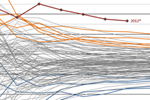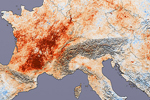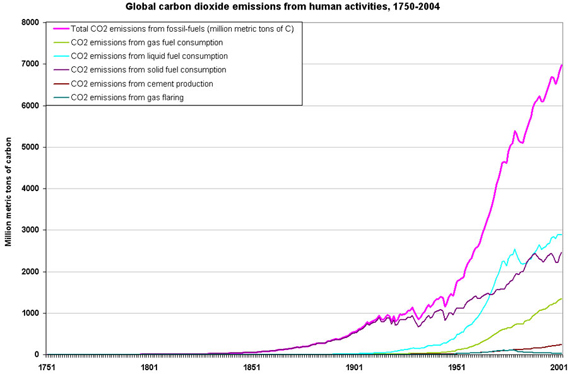The hour-and-a-half long debate between President Barack Obama and ex-governor Mitt Romney last night ended without a single reference to climate change. Frustrated with the lack of discussion on the issue from both candidates, environmental activists sent a petition with over 160,000 signatures to debate moderator, Jim Lehr, urging him to ask a question about climate change. The petition fell on deaf ears.
“Although Barack Obama and Mitt Romney sprinkle their speeches with mentions of energy and climate, they have remained stubbornly silent on the immediate and profound task of phasing out a carbon-based economy,” reads the website at Climate Science, which hosted the petition. “Their failure to connect the dots and do the math imperils our nation and prevents the development of a national and global plan to respond to the most urgent challenge of our era.”
The U.S. has suffered from a record drought as well as several record heatwaves and fires this year. In fact, July 2012 was the warmest month ever recorded in the U.S., including beating summer records from the Dust Bowl. In addition, just last month saw a new record low for Arctic sea ice extent, an event that took most scientists by surprise due to the scale of the melt.
Although climate change was a visible part of Obama’s 2008 campaign, he has barely mentioned the issue over the past years, following a failed attempt to pass climate legislation and stalled action internationally. For his part, Romney has recently been shifting his language on climate change during his long campaign. He recently questioned whether or not it is man-made, i.e. linked to greenhouse gas emissions, and made the issue the butt of a joke in his Republican National Convention Speech.
The world has warmed by 0.8 degrees Celsius (1.44 degrees Fahrenheit) since the early Twentieth Century with experts overwhelming pointing to a rise in greenhouse gas emissions, especially carbon, as the cause. In recent research, scientists have made increasingly convincing links between climate change and a rise in droughts and heatwaves. Scientists also expect climate change over time to swamp low-lying coastal areas and islands, threaten global agriculture, propel mass extinctions, melt glaciers, acidify the oceans, and possibly increase global conflict and insecurity.
Related articles
Arctic sea ice is ‘toast’ as old record shattered
(09/19/2012) Some twenty days after breaking the record for the lowest sea ice extent, the Arctic sea ice has hit a new rock bottom and finally begun its seasonal recovery. In the end, the Arctic sea ice extent fell to just 3.4 million square kilometers (1.32 million square miles) when only a few months ago scientists were wondering if it would break the 4 million square kilometers. The speed of the sea ice decline due to climate change has outpaced all the computer models, overrun all expert predictions, and shocked even the gloomiest scientists.
Obama approves preparation for oil drilling in Arctic, Shell en route
(08/30/2012) In the same week that sea ice in the Arctic Ocean hit another record low due to climate change, the Obama Administration has given final approval to Royal Dutch Shell to prepare for exploratory drilling in the region. Vehemently opposed by environmentalists and indigenous groups, the drilling plans are a part of the Obama Administrations ‘all of the above’ energy policy. Whether or not Shell will actually drill a well this season, however, is still up in the air as its oil spill containment barge remains docked in Washington state for an upgrade that could last several days.
Sea ice falls to record low with over two weeks of melting left
(08/27/2012) One of the most visible impacts of climate change—melting summer sea ice in the Arctic—just hit a new milestone. Scientists with the U.S. National Snow and Ice Data Center (NSIDC) have declared that this year’s Arctic sea ice extent dipped below the previous record set in 2007 as of yesterday. The record is even more notable, however, as it occurred more than a fortnight before the Arctic’s usual ice melt season ends, meaning the old record will likely not just be supplanted, but shattered.
July 2012: hottest month in U.S. history

(08/08/2012) Last month was not only the hottest July in U.S. weather history, but the hottest month ever recorded in the contiguous U.S, besting a record struck in July 1936 during the Dust Bowl, according to new data from the National Oceanic and Atmospheric Administration (NOAA). The average temperature last month over the contiguous U.S. was 77.6 degrees Fahrenheit, or 3.3 degrees Fahrenheit above the 20th Century average. Making matters worse, crippling drought continued to spread over 63 percent of the lower 48 states.
Earth’s ecosystems still soaking up half of human carbon emissions

(08/06/2012) Even as humans emit ever more carbon dioxide into the atmosphere, Earth’s ecosystems are still sequestering about half, according to new research in Nature. The study finds that the planet’s oceans, forests, and other vegetation have stepped into overdrive to deal with the influx of carbon emitted from burning fossil fuels, but notes that this doesn’t come without a price, including the acidification of the oceans.
Extreme heatwaves 50 to 100 times more likely due to climate change

(08/05/2012) A recent rise in deadly, debilitating, and expensive heatwaves was caused by climate change, argues a new statistical analysis published in the Proceedings of the National Academy of Sciences (PNAS). Climatologists found that extreme heatwaves have increased by at least 50 times during the last 30 years. The researchers, including James Hansen of NASA, conclude that climate change is the only explanation for such a statistical jump.
Drought, heat, fires push more Americans to accept reality of climate change
(07/19/2012) Record temperatures, wildfires, drought, and crop failures have is helping convince more Americans that climate change is real and occurring, reports Bloomberg.
